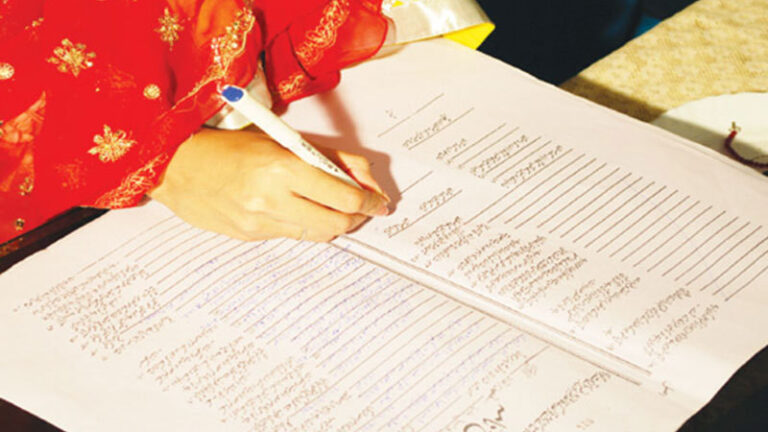SC says wife to benefit if Nikahnama terms unclear
ISLAMABAD:
The Supreme Court has ruled that in case of any ambiguity in the terms and conditions agreed at the time of wedding and written in the Nikahnama, the benefits would be given to wife, stressing that if someone else had filled the Nikahnama form, it cannot be used against the interest of the bride.
A two-member bench consisting of Justice Aminuddin Khan and Justice Athar Minullah issued on Tuesday a detailed 10-page judgment on an appeal relating to a couple’s divorce. The judgment was authored by Justice Athar Minullah.
According to the facts of the case, after the divorce, the woman approached the court for the return of dowry and other items under the conditions stipulated in the Nikahnama. When the matter reached the high court, the woman was given a plot mentioned in column number 17 of the Nikahnama.
Against the high court ruling, the appellant moved the Supreme Court, taking the stand that the purpose of the plot was that a house would be constructed there and as long as the marriage lasted the woman could live there. However, there was no such explanation written in the Nikahnama.
The legal question before the Supreme Court in the case was: if there was any ambiguity in the terms and conditions in the Nikahnama how it could be resolved. The court said that it was a settled law that any ambiguity in a contract was determined by the intention of the parties.
However, in this case, the judgment noted, before interpreting the terms and conditions of the Nikahnama, it should also be considered whether the bride had full freedom to give her consent to the terms and conditions of the marriage.
The judgment noted that in a male-dominated society, the terms and conditions were generally decided by the men on behalf of the bride. So, it added, If someone else filled the columns of the Nikahnama without meaningful consultation of the bride, it could not be used against the interest of the bride.
If there was ambiguity or doubt in the terms and conditions of the Nikahnama or in any entry or column, then the wife would get the benefit, according to the judgment. The Supreme Court upheld the decision of the high court and dismissed the appeal.

